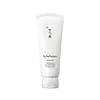What's inside
What's inside
 Key Ingredients
Key Ingredients

 Benefits
Benefits

 Concerns
Concerns

 Ingredients Side-by-side
Ingredients Side-by-side

Water
Skin ConditioningPotassium Cocoyl Glycinate
Disodium Cocoamphodiacetate
CleansingCocamidopropyl Betaine
CleansingAcrylates/Beheneth-25 Methacrylate Copolymer
PEG-200 Hydrogenated Glyceryl Palmate
CleansingSodium Chloride
MaskingPentylene Glycol
Skin Conditioning1,2-Hexanediol
Skin ConditioningSodium Methyl Cocoyl Taurate
CleansingCaprylyl/Capryl Glucoside
CleansingPEG-7 Glyceryl Cocoate
EmulsifyingParfum
MaskingIsostearic Acid
CleansingPotassium Hydroxide
BufferingButylene Glycol
HumectantLimonene
PerfumingDisodium EDTA
Ethylhexylglycerin
Skin ConditioningSodium Benzoate
MaskingTetrasodium EDTA
Coix Lacryma-Jobi Ma-Yuen Seed Extract
Skin ConditioningCitrus Unshiu Peel Extract
MaskingCastanea Crenata Shell Extract
Skin ConditioningLinalool
PerfumingSpirodela Polyrhiza Extract
Skin ConditioningDioscorea Japonica Root Extract
Skin ConditioningDextrin
AbsorbentTheobroma Cacao Extract
Skin ConditioningRubus Idaeus Fruit Extract
AstringentUlmus Davidiana Root Extract
Skin ConditioningSalicornia Herbacea Extract
Skin ConditioningMorus Alba Leaf Extract
Skin ConditioningAngelica Keiskei Extract
AntioxidantCitric Acid
BufferingTocopherol
AntioxidantWater, Potassium Cocoyl Glycinate, Disodium Cocoamphodiacetate, Cocamidopropyl Betaine, Acrylates/Beheneth-25 Methacrylate Copolymer, PEG-200 Hydrogenated Glyceryl Palmate, Sodium Chloride, Pentylene Glycol, 1,2-Hexanediol, Sodium Methyl Cocoyl Taurate, Caprylyl/Capryl Glucoside, PEG-7 Glyceryl Cocoate, Parfum, Isostearic Acid, Potassium Hydroxide, Butylene Glycol, Limonene, Disodium EDTA, Ethylhexylglycerin, Sodium Benzoate, Tetrasodium EDTA, Coix Lacryma-Jobi Ma-Yuen Seed Extract, Citrus Unshiu Peel Extract, Castanea Crenata Shell Extract, Linalool, Spirodela Polyrhiza Extract, Dioscorea Japonica Root Extract, Dextrin, Theobroma Cacao Extract, Rubus Idaeus Fruit Extract, Ulmus Davidiana Root Extract, Salicornia Herbacea Extract, Morus Alba Leaf Extract, Angelica Keiskei Extract, Citric Acid, Tocopherol
Water
Skin ConditioningPotassium Cocoyl Glycinate
Glycerin
HumectantAcrylates Copolymer
Propanediol
SolventCoco-Glucoside
CleansingCocamidopropyl Betaine
CleansingGlycyrrhiza Uralensis Root Extract
Skin ConditioningKaolin
AbrasiveOldenlandia Diffusa Extract
Skin ConditioningHydrolyzed Ginseng Saponins
Skin ConditioningMorus Alba Root Extract
BleachingLilium Candidum Bulb Extract
Skin ConditioningHoney
HumectantNelumbo Nucifera Flower Extract
Skin ConditioningPolygonatum Officinale Rhizome/Root Extract
Skin ConditioningPanax Ginseng Root Extract
EmollientPaeonia Albiflora Root Extract
Skin ConditioningRehmannia Glutinosa Root Extract
Skin Conditioning1,2-Hexanediol
Skin ConditioningWater, Potassium Cocoyl Glycinate, Glycerin, Acrylates Copolymer, Propanediol, Coco-Glucoside, Cocamidopropyl Betaine, Glycyrrhiza Uralensis Root Extract, Kaolin, Oldenlandia Diffusa Extract, Hydrolyzed Ginseng Saponins, Morus Alba Root Extract, Lilium Candidum Bulb Extract, Honey, Nelumbo Nucifera Flower Extract, Polygonatum Officinale Rhizome/Root Extract, Panax Ginseng Root Extract, Paeonia Albiflora Root Extract, Rehmannia Glutinosa Root Extract, 1,2-Hexanediol
 Reviews
Reviews

Ingredients Explained
These ingredients are found in both products.
Ingredients higher up in an ingredient list are typically present in a larger amount.
1,2-Hexanediol is a synthetic liquid and another multi-functional powerhouse.
It is a:
- Humectant, drawing moisture into the skin
- Emollient, helping to soften skin
- Solvent, dispersing and stabilizing formulas
- Preservative booster, enhancing the antimicrobial activity of other preservatives
Cocamidopropyl Betaine is a fatty acid created by mixing similar compounds in coconut oil and dimethylaminopropylamine, a compound with two amino groups.
This ingredient is a surfactant and cleanser. It helps gather the dirt, pollutants, and other impurities in your skin to be washed away. It also helps thicken a product and make the texture more creamy.
Being created from coconut oil means Cocamidopropyl Betaine is hydrating for the skin.
While Cocamidopropyl Betaine was believed to be an allergen, a study from 2012 disproved this. It found two compounds in unpure Cocamidopropyl Betaine to be the irritants: aminoamide and 3-dimethylaminopropylamine. High-grade and pure Cocamidopropyl Betaine did not induce allergic reactions during this study.
Learn more about Cocamidopropyl BetainePotassium Cocoyl Glycinate is an amino acid-based surfactant and cleaning agent. This ingredient can be derived from animals or plants. It may also be synthetically created from fatty acids of the coconut and glycine.
Potassium Cocoyl Glycinate is a gentle surfactant. Surfactants help gather the dirt, oil, and other pollutants from your skin to be rinsed away. It is a mild cleanser and naturally produces foam.
Water. It's the most common cosmetic ingredient of all. You'll usually see it at the top of ingredient lists, meaning that it makes up the largest part of the product.
So why is it so popular? Water most often acts as a solvent - this means that it helps dissolve other ingredients into the formulation.
You'll also recognize water as that liquid we all need to stay alive. If you see this, drink a glass of water. Stay hydrated!
Learn more about Water